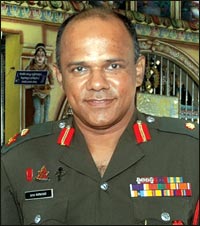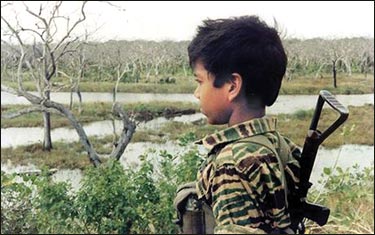Gaining peace, the saga of rehabilitation
Manjula Fernando
Just a few years, or even a few
months ago they knew only the power of the gun. They were trained to
take lives, not respect them. They had heard only of conflict and
destruction. The LTTE had brainwashed them into becoming killing
machines. With the end of the war, these LTTE cadres have been freed
from the shackles of the terrorist organization and have embarked on a
journey towards becoming useful citizens.
This noble effort is helmed by Major
General Daya Ratnayake, who was appointed the Commissioner General of
Rehabilitation two months ago. He is in charge of rehabilitating and
re-integrating battle hardened ex-LTTE combatants into civil society, a
formidable task which the Government has undertaken to carry out with
the help of the international community. In an interview with the Daily
News, Major General Ratnayake speaks about his challenges.
You were involved in an intense
battle with the LTTE at one point of time. They were your enemy. Why do
you think you were chosen to shoulder this important task of
re-integrating the ex-combatants?
This is a question you must ask the people who appointed me.
We were involved in fighting for the past 30 years. The military
aspect of this conflict was only a small portion.
|

Major General Daya Ratnayake. Pictures by Samantha Weerasiri |
There were a lot of other relative issues, socio-economic, political,
humanitarian and civil. Ours was not an ordinary battle fought with
guns.
In the aftermath of a long dragged conflict, the military officials
get invited to shoulder administrative responsibilities.
The idea may be because we possess a better understanding of the
conflict and the immediate needs.
You succeeded to the post of the Commissioner General of
Rehabilitation, a post created in 2006 by President Mahinda Rajapaksa.
Do you propose to change the methodology adopted in re-integrating these
ex-combatants ?
We already had a system for rehabilitating ex-cadres since 2006 but
the numbers then were much low. There are about 10,000 ex-cadres with us
now.
This figure is expected to increase to 15,000 with the ongoing
screening in the IDP camps to filter out ex-LTTE cadres.
The Government has taken the re-integration of ex-cadres seriously.
We want to expand the infrastructure and set up a separate institution
for this purpose. This is not a kind of a part time job anymore.
This is a sensitive issue. Therefore the Government is anxious to
ensure that all the key elements are addressed to evolve a comprehensive
re-integrating mechanism.
The conflict is over now but we are faced with the physical battle of
bridging the gap created during the war.
Are we following an indigenous
approach or an international model?
We have looked at international experience, regional models, and
experience gained during the JVP insurgency and designed our own formula
for rehabilitation. The next step would be re-integration. We have now
worked out a master plan. It has addressed all the key elements. We want
to have a homegrown system which suits us the best, touching on
religious, cultural, ethical and moral values.
These values have been systematically taken away by the LTTE. We have
to inculcate these values back in their minds.
We are going to transform the ‘once dangerous terrorists’ into
responsible peace-loving citizens in society.
Is it true you have been given a
freehand to perform duties with a lot of powers?
Not only a freehand but also a very good concept. The President
wants this idea to be put into practice. I receive enormous support from
Senior Presidential Advisor Basil Rajapaksa MP and Justice Minister
Milinda Moragoda under whose purview I operate.
I am happy to work in such an environment. We have produced a
National Action Plan and I am keen to get this properly done.
Are there any hardcore LTTEers who
have committed serious crimes, among these ex-cadres? How do you deal
with them?
Yes, we have all sorts of cadres who had committed inhuman acts, from
novices to hardcore members. Their background has been traced, age, who
they are, what their position in the organization, family details,
education, skill level and desires and hopes.
The profiling has been completed.
From the day one of their identification, these facts have been
collected. The Army had carried out a great job.
I am grateful to the Army Commander, the field Commanders and the
intelligence officers for making my job easy. I only need to fill the
gaps.
Now that the profiling is completed,
where would you go from here?
|

Child soldiers looking ahead to a bright future. File photo |
Now the proper re-habilitation will commence. The ex-cadres will be
separated into groups of 500 each, based on their profiles.
They will be exposed to the business community where they can
interact and learn about future employment opportunities and
availability.
Then they will be re-grouped based on different future aspirations.
Our target is to set up 20 ‘Protection, Accommodation and
Rehabilitation Centres’ to house these ex-cadres.
How do you tackle the psychological
aspect?
There is a comprehensive program. This is one of the main components
of the rehabilitation program, psychological and spiritual guidance.
How long will they undergo this
transformation?
We have planned it for five years. But the main process will be for
one to two years. Until they become self sufficient, we will look after
them.
There is a different approach towards child soldiers. International
organizations including the UN are working with us.
More attention will be paid to heal the psychological trauma in
children than in other cadres.
The majority of the detained cadres are between 18 to 35 years. The
child conscripts are from 12 to 18. We have one combatant who is 70
years.
Could the ex-combatants ever be
normal human beings, considering the bitter experience they were exposed
to, especially the child soldiers?
Definitely, they will be responsible human beings.
What is in store for the ex-cadres at
the end of their rehab program?
Our objective is to find employment for every one of them. Among the
detainees, there are about 4,000 skilled persons, the rest are non
skilled. Seventy percent of the skilled have a farming background. The
training to the ex-cadres will ensure that they could go back to their
villages and contribute to national development.
We have made arrangements for the child soldiers to pursue school
education. Government teachers conduct daily lessons in the welfare
centres. A batch of ex-cadres is preparing to sit the GCE O/L
examination in December this year. Another group sat the GCE Advanced
Level last August.
What are the obstacles you have faced
up to now? Is there a dearth of psychiatrists?
International agencies like the UN have come forward to help us in
this challenge. The magnitude of this task is overwhelming and a huge
challenge for a country like ours. But we have taken up the task of
integrating a disintegrated community.
The local community, Tamil Diaspora and especially the business
community have shown a great interest in assisting us in this endeavour.
There is a role to be played by society as well. They must be ready
to accept these people. If it can play an active role our job would be
faster and much easier.
Would anyone want to recruit an
ex-combatant into their ranks?
The response from the business community to our program is
encouraging and positive. Some large companies especially in the
agriculture sector has shown an interest to recruit some of these
ex-cadres after they are rehabilitated. The President and the Defence
Secretary too are happy with the outcome.
Sending ex-cadres for overseas jobs is one of the incentives offered
in the re-integration process. Given the fact the LTTE is much strong on
the international front, don’t you think sending the ex-cadres overseas
for jobs is a risky undertaking?
We are confident that once the rehabilitation process is completed
these people will not want to be part of the LTTE ever again. The
rehabilitation is not about taking these 10,000 to our side.
The objective is to make them become responsible citizens. Make sure
that they will never ever want to further the cause of terrorism or
separatism. |



